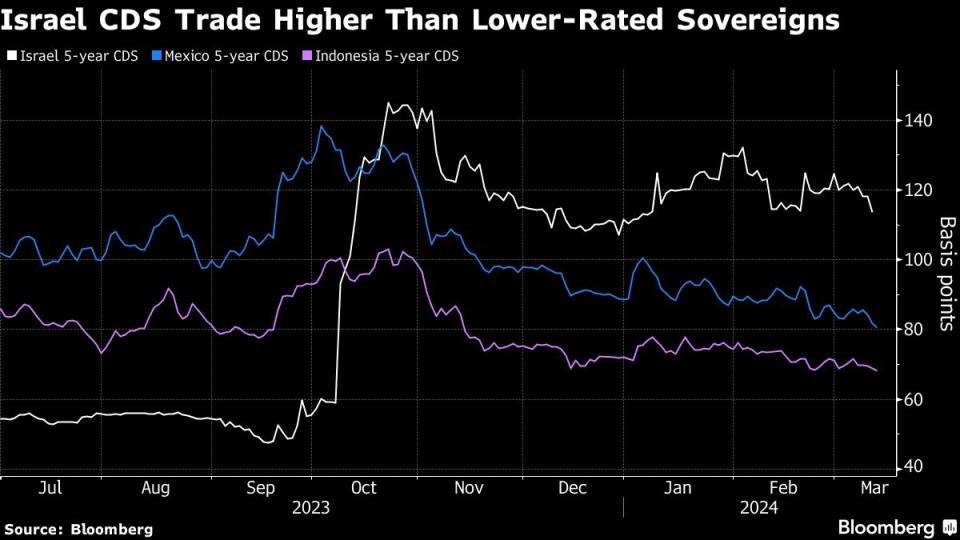Israel’s Record War Budget Gets Final Nod After Last-Minute Snag
(Bloomberg) -- Israel’s parliament gave final approval on Thursday to a revised 2024 budget swollen by defense outlays that will bring spending to an all-time high.
Most Read from Bloomberg
Putin Says Ukraine Deal Requires Security Pledges for Russia
Millennium Trader Scored $40 Million Windfall in Egypt FX Plunge
An $80 Billion Crash in India’s Small Caps Flashes Warning Signs
The vote in the Knesset overcame delays after several members of Prime Minister Benjamin Netanyahu’s ruling coalition threatened to derail the measure if their budgetary requests weren’t met. The fiscal plan envisages the deficit at 6.6% of gross domestic product, a shortfall set to be among the widest for Israel this century.
Expenditure will total 584 billion shekels ($160 billion), up almost 70 billion shekels from the budget’s pre-war version. Defense spending alone will go up by 55 billion shekels.
The budget that emerged from weeks of controversy reflects the competing pressures the government needs to balance as the military campaign against Hamas enters its sixth month. The fiscal costs of Israel’s worst armed conflict in 50 years have forced the government to rely far more on debt to fund its needs and pay a war bill the central bank estimates at 255 billion shekels over 2023-2025.
The surge in spending, alongside an expected drop of 36 billion shekels in revenue, forced budget cuts and led to a separate parliamentary approval of a set of adjustments involving new taxes. But political disagreements at the last minute meant some measures were left out, shrinking the original 25 billion-shekel package by almost 10% for 2024-2025.
An increase in value-added tax to 18% from 17% was a key fiscal adjustment that won approval. The measure, which will go into effect next January, is “likely the most substantial” step taken so far “towards reducing the deficit,” according to Yonie Fanning, chief strategist at Bank Mizrahi Tefahot’s Finance Division.
While likely to push up inflation, the higher levy will generate slightly over 7 billion shekels in extra tax income per year, Fanning said in a report ahead of the vote. New or increased taxes were also imposed on cigarettes and tobacco, health and social security services, and electric vehicles.
Under Microscope
The budget will draw the scrutiny of markets and rating companies, especially after Israel’s sovereign credit ranking was cut for the first time in its history last month by Moody’s Investors Service, with a negative outlook.
Fitch Ratings, which also has the nation’s credit score on negative watch, is set to publish its assessment within the next few weeks. S&P Global Ratings is scheduled to release its decision on Israel on May 10 after revising the outlook to negative several weeks into the war.
Israel’s credit-default swaps — or the cost of protecting against a default — remain elevated. Still, the government’s debt has been in high demand by investors, with Israel selling $8 billion of international bonds earlier this month — the nation’s first such offering in public markets since the war erupted.
Discussions around the budget led to compromises that spared many of the outlays on religious institutions and other political causes advocated by Netanyahu’s ultra-Orthodox and far-right allies, whose support he needs to remain in power.
Authorities scaled back by less than a third what are known as “coalition funds,” an 8 billion-shekel discretionary allocation set aside for the five parties comprising the ruling government. This funding is partially intended for West Bank settlements and religious schools that don’t teach math and English.
The fiscal path ahead now hinges in large part on whether the conflict is contained. Tensions have been on the rise along Israel’s northern border, where its military has been exchanging fire with Iran-backed Hezbollah.
Besides what the central bank called a “transitory increase” in the budgetary costs from the war, Israel already faces a more permanent jump in defense spending that will total about 30 billion shekels from 2025 onward.
Some of the adjustments in the latest budget are designed to accommodate that increase without further inflating Israel’s share of debt to GDP. Israel entered the war with a relatively low ratio of around 60% but it’s now on track to rise to 67% this year.
(Updates with budget details starting in sixth paragraph.)
Most Read from Bloomberg Businessweek
Gold-Medalist Coders Build an AI That Can Do Their Job for Them
Academics Question ESG Studies That Helped Fuel Investing Boom
Luxury Postnatal Retreats Draw Affluent Parents Around the US
©2024 Bloomberg L.P.




